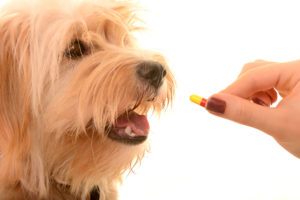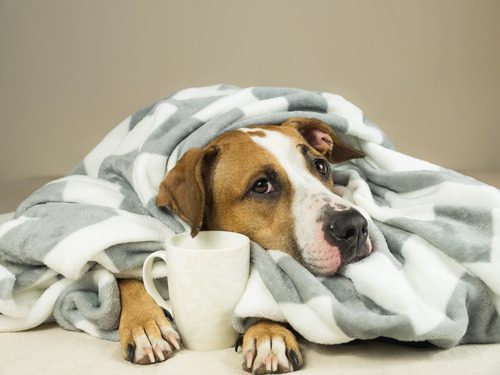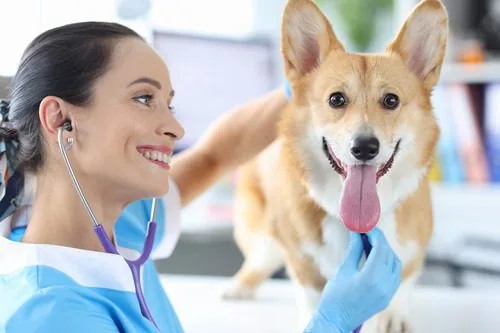How Much Benadryl Should I Give My Do
Benadryl is an over-the-counter medication that is used to treat allergies in people, and dogs can also take Benadryl for various reasons. Benadryl is considered an antihistamine medication.
The amount of Benadryl you give your dog will depend on their weight. Typically, Benadryl comes in a 25-milligram pill. If your pup is a smaller dog, they will take less than one pill, and heavier dogs may require more than one pill.
Some pet parents will also use Benadryl to tame their dog’s anxiety. If you want to know the appropriate dose of Benadryl for dogs, read on for more information.

What Exactly is Benadryl?
Diphenhydramine HCL is the active component in Benadryl. The medication works by blocking the natural substance in the body called histamine, which is why this class of drug is called an antihistamine.
Antihistamines are medications utilized for the treatment of allergies. Veterinarians have found that Benadryl works similarly in dogs as in humans, but it is still essential to be careful.
What is the Appropriate Benadryl Dosage for Dogs?
Even though Benadryl is a human medication, many vets feel it is safe for dogs. It is essential to consider that you need to give your dog an appropriate dose to keep your pup safe. You need to follow your veterinarian’s instructions and give no more to your dog than what they recommend.
A moderate dose of Benadryl for your dog is one milligram of Benadryl per pound of your pup’s weight. Administer the medication two to three times a day. For example, a 25-pound dog could be given 25 milligrams in the morning, afternoon, and night. Try to aim for every eight to twelve hours.
Some vets prefer to use children’s Benadryl for a smaller dog because it contains smaller amounts of Diphenhydramine. Benadryl is also available in other forms, but you should never give your dog a timed-release Benadryl. It may break down too quickly in your dog’s stomach because it was intended for a human.
You may need to modify the dose if you are giving your pup the children’s liquid Benadryl, as it is not absorbed the same as pills. This distinction is why it is wise to be careful when giving your dog medication and always consult with your veterinarian first.
Veterinarians can also prescribe the dog version of Benadryl. It is a medication called Vetadryl, the FDA-approved form of Diphenhydramine for dogs and cats. It comes in different milligrams to suit various dog sizes, and it has flavoring for dogs, which can help make it less distasteful to them.
What Are the Side Effects of Benadryl?
There are side effects of Benadryl, just as there are with any drug. You must observe your dog carefully to ensure they are not having a bad reaction. Some of the common side effects include:
- Drooling
- Drowsiness
- Rapid breathing
- Dry mouth
- Elevated heart rate
- Decreased urination
There is also the possibility of overdosing on Benadryl. Some signs of overdose include agitation, constipation, rapid heartbeat, dilated pupils, and seizures. Contact your vet right away if you believe your pup has overdosed on Benadryl. It is also crucial to take note if your dog suffers from certain health conditions, Benadryl may not be safe.
Benadryl can also come in forms that contain ingredients such as acetaminophen for fever or phenylephrine, which is a decongestant. It is imperative that when giving your dog Benadryl, you make sure that the only active ingredient is Diphenhydramine.
What Are the Common Uses of Benadryl in Dogs?
There are certain instances in which your vet may recommend giving your dog Benadryl. Benadryl is primarily used for treating allergies in humans but is also given to pups to treat various conditions.
Environmental Allergies
Allergies arise when there is an overreaction of the immune system. Vets often use Benadryl to treat environmental allergies that can cause itching and sneezing. Benadryl can help your dog to alleviate mild to moderate allergy symptoms such as:
- Red, itchy skin
- Sneezing or runny nose
- Coughing or wheezing
- Hot spots from scratching
- Irritated eyes or itchy eyes
- Hives or swelling
Environmental allergens that pups battle against include dust, mold, pollen, grass, and trees. When there is dust or mold around, the pup’s body may see these irritants as invaders, like bacteria. When histamine is released, it triggers inflammation, attacks the upper respiratory and digestive systems, and can bombard the skin.
The inflammation irritates the skin, and it becomes red and itchy. Inflammation can affect many different areas of the body. The allergies may also be seasonal, which means that they typically occur in the spring, summer, and fall.
Flea Irritation
Even if your dog only has a single flea bite, it may itch, and the area can become irritated. If you think your dog needs Benadryl for excessive itching due to a flea bite, you may want to check to make sure. You will need to comb through the direction their hair grows to see if there is any flea dirt, which resembles coffee grounds.
If your dog has fleas, you may find that they have red bumps in the following areas:
- Groin
- Belly
- Under the legs
- The base of the tail
If your pup has fleas, they may also be constantly scratching and experience hair loss due to scratching.
Bee Stings
Dogs, like humans, can react badly to a bee sting. There are even some cases in which a bee sting can be life-threatening. Bees, wasps, hornets, and yellow jackets have a tendency to be the most common types of insects with stingers. Benadryl is often given to dogs who have been stung by a bee. Some of the symptoms your pup may experience after an unfortunate encounter with the painful sting of a bee include:
- Redness of the skin
- Itchy skin
- Hives on the skin
- Swelling of the eyes, nose, or neck
- Stiffened ear flaps
- Vomiting or diarrhea
The above is a basic list of symptoms your dog may experience if they get stung by a bee. However, if your dog displays specific symptoms, such as widespread swelling, severe itchiness, welts that engulf much of the body, or difficulty breathing, get them to the emergency vet immediately.
If your pup has a bee sting or has any of the above symptoms, take them to the veterinarian to be safe.
 Should I Give My Dog Benadryl for Anxiety?
Should I Give My Dog Benadryl for Anxiety?
Benadryl is sometimes used off-label for anxiety in people, which is no different from dogs. Some pet parents give Benadryl to their dog when their pup is feeling anxious or afraid. Some of these instances include:
- Vet visits
- Car rides
- Fireworks
- Thunderstorms
Separation anxiety, street traffic, and traveling are other anxiety triggers in your pup. Benadryl has been shown to help with mild to moderate anxiety in dogs due do its sedative-like effect. It is great if your pup can catch a nap during situations that may stress them out or make them anxious. However, if your pup needs to be awake and alert, you should refrain from giving it to them.
Conclusion
Benadryl is a human medication typically used for treating allergies, and it is often given to dogs for the same reason. Although it is common for people to give their dogs over the counter medication such as Benadryl, it is very important that you speak to your dog’s veterinarian first before giving them any medication. Overmedicating your dog, or giving your dog the wrong form of a medication, can lead to serious injury or even worse.
Do you still have questions regarding Benadryl dosage for your Atlanta, GA pup? Make an appointment at The Village Vets!
Recent Posts
About The Village Vets
The Village Vets is a network of animal hospitals based in Atlanta, GA and the surrounding area. We offer honest, excellent service to our clients in a comfortable, friendly atmosphere. To learn more about our locations and how we can better serve you and your pet, click the button below.
Share This Post
Recent Posts
About The Village Vets
The Village Vets is a network of animal hospitals based in Atlanta, GA and the surrounding area. We offer honest, excellent service to our clients in a comfortable, friendly atmosphere. To learn more about our locations and how we can better serve you and your pet, click the button below.



